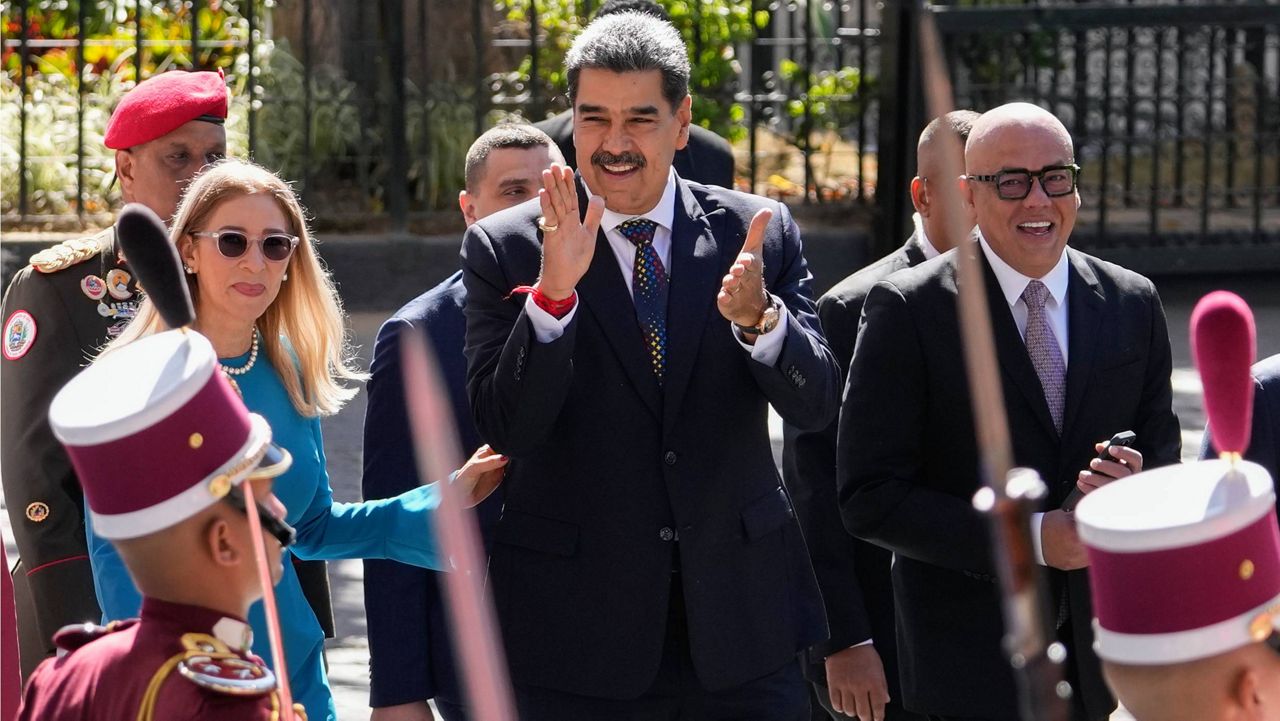CARACAS, Venezuela — Venezuelan President Nicolás Maduro was sworn in Friday to serve a third six-year term, extending his increasingly repressive rule until 2031 despite protests and credible evidence that his opponent won the election.
What You Need To Know
- Venezuelan President Nicolás Maduro has been sworn in to a third term despite credible evidence that his opponent won the latest election
- Maduro's inauguration Friday follows protests in the South American country and abroad against his increasingly repressive rule
- On Thursday, aides to the political opposition's most prominent leader reported she was briefly detained by state security forces
- The government denied the accusation, but the claim again drew global attention to Venezuela's protracted political crisis
Venezuela's legislative palace, where he was sworn in, was heavily guarded by police, military and intelligence officers. Crowds of people, many sporting pro-Maduro T-shirts, gathered in adjacent streets and a nearby plaza.
Standing before officials, Maduro cited historic figures including his predecessor, Hugo Chávez.
"I swear by history, I swear by my life," Maduro said. His followers erupted into cheers.
One of them was Maricarmen Ruiz, 18, who couldn't hold back her tears.
"I don't have words to express my emotion, I'm happy," she said, expressing relief that opposition leader Edmundo González wasn't "imposed" instead as president.
The opposition collected tally sheets from more than 80% of electronic voting machines following the July 28 election, posted the tallies online and said they show González won twice as many votes as Maduro.
On Thursday, as hundreds of anti-Maduro protesters took to the streets of the capital, Caracas, aides to opposition leader María Corina Machado said she was briefly detained by security forces and coerced into recording videos.
The popular former lawmaker, whom the government has barred from running for office, had emerged from months of hiding to join the rally to demand González be sworn in instead of Maduro.
Machado addressed the rally then left on a motorcycle with her security convoy. Machado's press team later announced on social media that security forces "violently intercepted" her convoy. Her aides confirmed to The Associated Press that the opposition hardliner was detained.
Leaders in the Americas and Europe condemned the government for suppressing opposition voices and demanded her release. U.S. President-elect Donald Trump expressed his support for Machado and González.
"These freedom fighters should not be harmed, and MUST stay SAFE and ALIVE!" Trump said on Truth Social.
Maduro's supporters denied that Machado was arrested, saying government opponents were spreading fake news to generate an international crisis.
The brouhaha ahead of Maduro's inauguration added to the litany of allegations of electoral fraud and brutal repression to silence dissent.
Electoral authorities loyal to the ruling party declared Maduro the winner hours after polls closed on July 28, but unlike in previous presidential elections, they did not provide detailed vote counts.
Global condemnation over the lack of transparency prompted Maduro to ask the country's high court — also filled with allies of his United Socialist Party of Venezuela — to audit the election results. The court reaffirmed Maduro's victory without providing thorough evidence and encouraged the electoral council to release the vote counts. But neither the council nor the ruling party produced any evidence that Maduro had won, even though their voting center representatives also were entitled to tally sheets from every voting machine.
The U.S.-based Carter Center, which observed the election on the government's invitation, declared the opposition-published tallies legitimate. Other election experts that the government allowed to witness the vote said polling records published online by the opposition faction appear to exhibit all of the original security features.
The dispute over the results prompted international outrage and nationwide protests. The government responded with full force, arresting more than 2,000 demonstrators and encouraging Venezuelans to report anyone they suspect to be a ruling-party adversary. More than 20 people were killed during the unrest and many protesters reported being tortured in custody.
In a speech following his swearing in, Maduro said his government has "complied with the constitution," despite little evidence that he won the election and international claims of fraud. He accused external powers of "attacking" Venezuela, specifically the U.S. government, and promised to guarantee "peace and national sovereignty."
"Today more than ever I feel the weight of commitment, the power that I represent, the power that the constitution grants me," he said. "I have not been made president by the government of the United States, nor by the pro-imperialist governments of Latin America."



